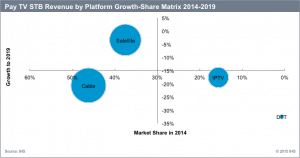Set-top market facing five-year decline, says IHS
 The pay TV set-top box market contracted for the first time in 12 years last year, according to research by IHS, with total sales falling from US$15.9 billion (€14.2 billion) in 2013 to US$15.3 billion in 2014.
The pay TV set-top box market contracted for the first time in 12 years last year, according to research by IHS, with total sales falling from US$15.9 billion (€14.2 billion) in 2013 to US$15.3 billion in 2014.
According to the research group’s Set-top Box Market Monitor, actual shipments of boxes grew slightly, up just under 1% to 204.7 million units, an increase that failed to compensate for the impact of price erosion in a competitive market.
IHS predicts that the market will continue to contract this year, falling to US$15.1 billion, ahead of further falls to US$13.2 billion by 2018 before stabilising in 2019.
Contraction is already producing consolidation in the market, said IHS, citing Arris’s proposed acquisition of Pace, the withdrawal of some Korean manufacturers and the delisting of ADB as symptoms of the overall market trends.
The market for satellite boxes will sustain the most value and provide the most opportunity for vendors, according to the research group because of the limited ability of satellite TV players to virtualise applications such as DVR into the cloud. Continued pay TV growth in Africa and the Middle East will also provide growth, said IHS.
In the longer term, the launch of UHD and 4K services could provide opportunities for box manufacturers, with an estimated US$240 million of UHD set-tops to be shipped this year. UHD box shipments to pay TV operators will be worth US$5.4 billion by 2019, comprising 40% of the market’s value.
“Pay TV STB vendors have had a great run since 2002, with strong global pay TV growth, cable digitization mandates, the introduction of digital video recorders, high definition TV, and Internet protocol TV all providing sustained stimuli for the market,” said Daniel Simmons, head of connected home research at I HS Technology.
“The industry is now at an inflection point. Mature pay TV markets are saturated with high-value advanced boxes, so shipments are set to decline there; and operators in emerging markets aren’t transitioning to advanced boxes fast enough to increase overall industry value.”



